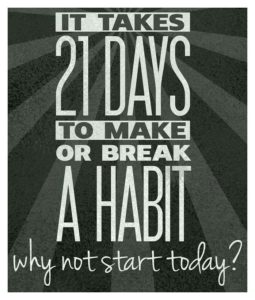
We’ve all seen that quote —

So that’s just three weeks.
Right?
Wrong!
WRONG! WRONG! WRONG!!!
That quote — the one that says it takes 21 days to form a new habit — is actually kind of a misquote.
A quote that has mutated.
Back in the 1950’s, a plastic surgeon named Maxwell Maltz noticed a trend among his patients.
He noticed that it took most of them about 21 days to adjust to changes in their appearance. And he ended up writing a book entitled Psycho-Cybernetics that was super successful, and in it, he wrote:
“These, and many other commonly observed phenomena tend to show that it requires a minimum of about 21 days for an old mental image to dissolve and a new one to jell.”
A minimum of about 21 days.
Over the years, this was shortened to a definitive 21 days.
I don’t know about you, but that’s not the case for me.
And apparently it’s not the case for most other people either.
In reality, it takes an average of 66 days for something to become a habit.
That’s three times what we’ve all been made to believe!
And that’s no hard and fast rule, either.
The time it takes for something to become a habit depends on the individual, and it also depends on how big of a habit you are trying to develop.
A sedentary person who is trying to make exercising every day a habit will most likely have a much easier time of doing that for 5 minutes every day as opposed to an hour a day.
A person who is always open to change will probably develop a new habit much more easily than one who is resistant to change.
But you can expect it to take you at least two full months to develop a new habit.
(Keep this in mind if you are struggling with getting your children to develop new habits !!!)
If there are new habits you’d like to establish you are going to have to be realistic.
Historically, this is one of my biggest problems. I bite off way more than I can chew. I have about fifteen new habits I want to establish on January 1st or the beginning of the school year or when a new season arrives.
It’s too much.
And ultimately, I end up establishing zero new habits.
That’s the problem in this day and age of moms who feel the need to do it all (at once) and instant gratification.
We probably wouldn’t ever advise our kids to try to make fifteen major changes at once.
But we continue to do it to ourselves.
So here is how I am approaching things now…
I have a whole bunch of goals. I have fitness goals and personal goals and parenting goals and financial goals and marital goals.
Just writing that out right there is overwhelming! Because in each of those categories, I have a whole bunch of smaller goals.
I have to be reasonable! I can’t add in ten new habits and maintain them all for 66 days.
I’ll just set myself up for failure that way.
So what I need to do is prioritize.
And choose one habit to really focus on.
Then I need to give myself two months to focus on it.
Taking better care of myself is always a goal. Because when I do that, it leads to all the other goals.
When you neglect yourself, it’s tough to be a better parent or spouse or athlete or whatever.
If you are exhausted or overweight or overworked or stressed out and always putting your needs last, you become angry and resentful. And unhealthy.
And when all that happens you have put yourself in a position where any other goals you have for yourself become much more difficult to achieve.
Taking care of yourself is a big goal though. It’s super general. And it’s difficult to measure.
It’s also not something that can be done with one magical change.
There are lots of healthy habits that go into taking care of yourself.
Regular exercise, eating well, getting enough quality sleep, spending time with friends…
I have lots of room for improvement in the eating department and in the quality sleep department.
But it’s the eating that is affecting me the most.
So that’s where I’m starting.
Of course, there are so many habits that go into healthy eating.
Planning and prepping are a couple. But those can often seem overwhelming.
So I’m starting in a different place.
I very rarely eat a meal seated at the table.
In the mornings, I eat standing in the kitchen or often in the car, and at night, I almost always eat while I’m sitting on the couch after all the kids have gone to bed.
I know that one is a huge NO-NO as far as healthy eating habits go.
I really need (and want) to work on being a more mindful eater.
So the first habit I’m working to establish is eating dinner seated in either the kitchen or the dining room.
I’m not even worrying about exactly what I eat right now.
I mean, I am going to do my best to plan and to prep stuff in advance, and I am going to do my best to make better choices, but the important thing is to sit at a table.
This one is going to be tough for me because I have been doing this for years now. Initially it started because there was no room in the kitchen for all of us to sit and eat. And with so many little kids, I just wanted to get them all fed, and then I’d worry about myself later (there is that mom-not-taking-care-of-herself phenomena that affects us all so often). After a while, I just came to associate eating dinner on the couch uninterrupted and in front of the television as my reward for making it through the day.
So I think this one is gonna take me at least 66 days.
While it’s going to require a serious effort on my part, what I do know is that changing this habit will not only help me to be more mindful of what I am eating and, in the process maintain a healthy weight, but it will make eating at the table for all my other meals more of an automatic.
That will set a better example for my kids. Which will help me be a better parent. Which is always another goal.
Little habits can have a domino effect.
So that’s where I’m going to start.
Eating dinner seated at the table. Starting tonight.
And how about you?
What small and manageable habit will you start with?
Rather than start with get 8 hours of sleep every night, what if you started with charge the phone in the kitchen at night?
That’s a habit that will lead to improving the quality of your sleep.
Just focus on that one thing for the next two months.
Then, once you are feeling success in that department you can add in another habit to improve the quality of your sleep. Maybe by then you are used to not having your phone in the room, and the next habit you develop each night is reading ten minutes in bed every night rather than scrolling through Facebook.
Or maybe just the habit of keeping the phone out of your room at night has already improved the quality of your sleep enough that now you can move onto a habit in a different area of your life.
Maybe now you are sleeping better, so you can get up ten minutes earlier in the morning.
You can do a lot in ten minutes.
You could exercise. Yeah, it’s only ten minutes. But it’s ten minutes more than you did the day before. And it’s opening the door for you.
Once ten minutes of exercise is a habit, then it’s much easier to make fifteen minutes of exercise a habit.
Maybe exercise is already an established habit.
Whatever you choose to do, when you open up those ten minutes, you make room for the next habit. And you can use those ten minutes to establish a second habit for the next (at least) 66 days.
Many times, one of these habits will get you closer to one of those big goals you had without even realizing it.
There is a pretty good chance that removing the phone from your room will not only improve the quality of your sleep, but also the quality of your marriage.
There is that domino effect again!
So reconsider vague, sweeping goals and resolutions.
Instead, think about the big areas of your life. Think about the habits that will improve them.
And then, start small, pick one, and give yourself at least 66 days to focus on it.
When you do that, you are setting yourself up with some pretty big potential for change.

I like your thoughts on New Years resolutions and agree, will be doing something similar. Happy New Year, make 2017 your best year yet!